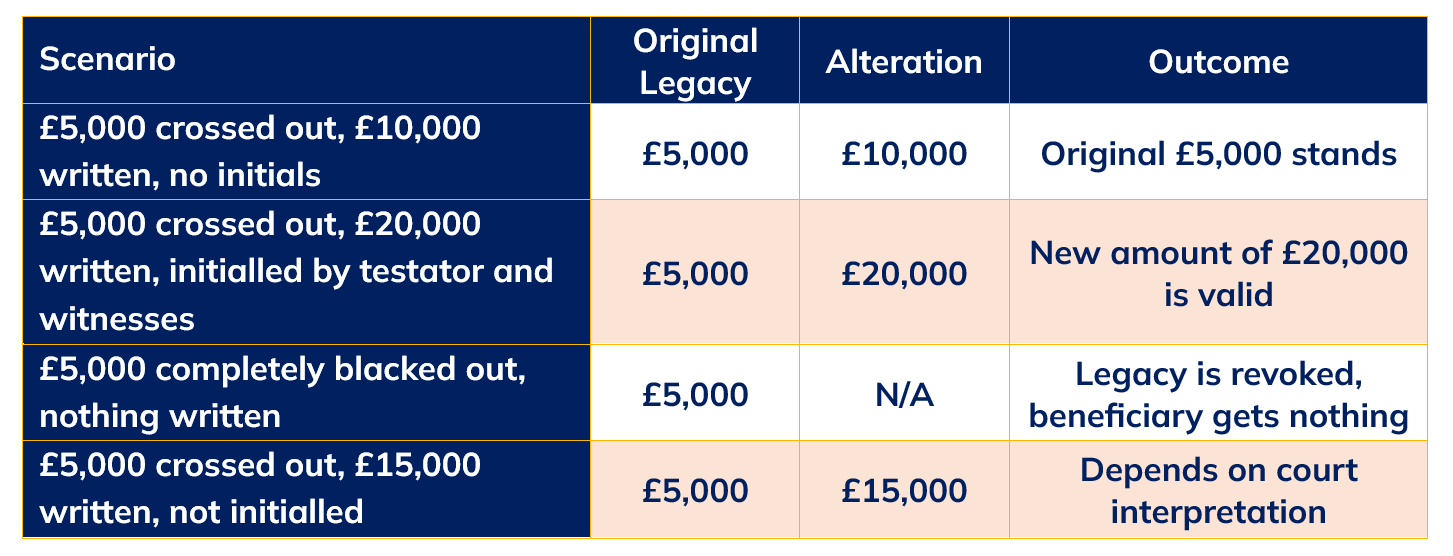Table of Contents
1. Introduction
2. Can I Change My Will?
3. Methods to Amend Your Will
3.1 Amending the Face of the Will
3.2 Using Codicils
3.3 Making a New Will
4. Common Mistakes to Avoid
5. International Considerations
6. Conclusion
1. Introduction
Have you ever wondered if you can update your Will? Perhaps your life circumstances have changed, or you’ve had a change of heart about certain decisions. The good news is that you can indeed amend your Will. This article will guide you through the process, highlighting the dos and don’ts to ensure your final wishes are accurately reflected.
2. Can I Change My Will?
Yes, you can change your Will at any time, provided you have the mental capacity to do so. However, it’s crucial to make these changes correctly to ensure they’re legally valid. While it’s possible to make some changes yourself, it’s always safest to consult with a legal professional to avoid potential pitfalls.
3. Methods to Amend Your Will
There are three main ways to amend your Will:
3.1 Amending the Face of the Will
This method involves making changes directly on the original Will document. While it might seem straightforward, it’s fraught with potential issues.
Before Execution: If you make changes before signing the Will, ensure that you and your witnesses initial and date all alterations. This helps prove the changes were made before execution.
After Execution: Changes made after the Will has been signed must be executed like a new Will to be valid. This means you and your witnesses must initial beside each alteration.
Let’s look at some examples:

As you can see, amending the face of a Will can lead to unintended consequences. It’s best reserved for minor corrections like fixing spelling errors or updating addresses.
3.2 Using Codicils
A codicil is a separate document that amends specific parts of your Will without rewriting the entire document. It’s useful for making simple changes, such as adding a new executor or including a small legacy.
Here’s how codicils work in practice:
1. Updating beneficiaries: If your Will leaves something to “my daughter’s husband” and your daughter remarries, a codicil can ensure the gift goes to her current husband.
2. Changing specific gifts: If your Will leaves “my car” to someone, a codicil can clarify which car you mean if you’ve acquired a new one since writing the Will.
To make a codicil, follow the same formalities as making a Will: sign it in the presence of two witnesses who must also sign in your presence.
3.3 Making a New Will
For significant changes, creating a new Will is often the best option. This approach:
– Revokes all previous Wills and codicils
– Allows you to start fresh with your current circumstances
– Reduces the risk of confusion or contradictions
Consider making a new Will if you’ve experienced major life changes like marriage, divorce, or the birth of children or grandchildren.
4. Common Mistakes to Avoid
When amending your Will, be careful to avoid these common errors:
– Using pencil for amendments (always use ink)
– Failing to have witnesses for changes
– Making ambiguous alterations
– Neglecting to date the changes
– Attempting complex changes without professional help
5. International Considerations
If you own assets in different countries or plan to move abroad, be aware that:
– Will amendment laws may differ between jurisdictions
– Some countries may not recognize certain types of amendments
– You might need separate Wills for assets in different countries
Always consult with a lawyer familiar with international estate planning, or a lawyer who specialises in the local jurisdiction in question, in these situations.
6. Conclusion
Amending your Will is possible and sometimes necessary, but it must be done correctly to be legally valid. While minor changes can potentially be made yourself, it’s always safest to consult with a legal professional. They can ensure your amendments are clear, legally binding, and truly reflect your wishes.
Remember, your Will is one of the most important documents you’ll ever create. Taking the time to keep it up-to-date and accurate is a valuable gift to your loved ones, providing clarity and peace of mind during a difficult time.
If you’re considering changes to your Will, don’t hesitate to seek professional advice. It’s a small investment that can prevent significant problems in the future.
We have Storage Plans and Legacy Care Plans to help make storing and updating your Will easier and more cost-effective.






